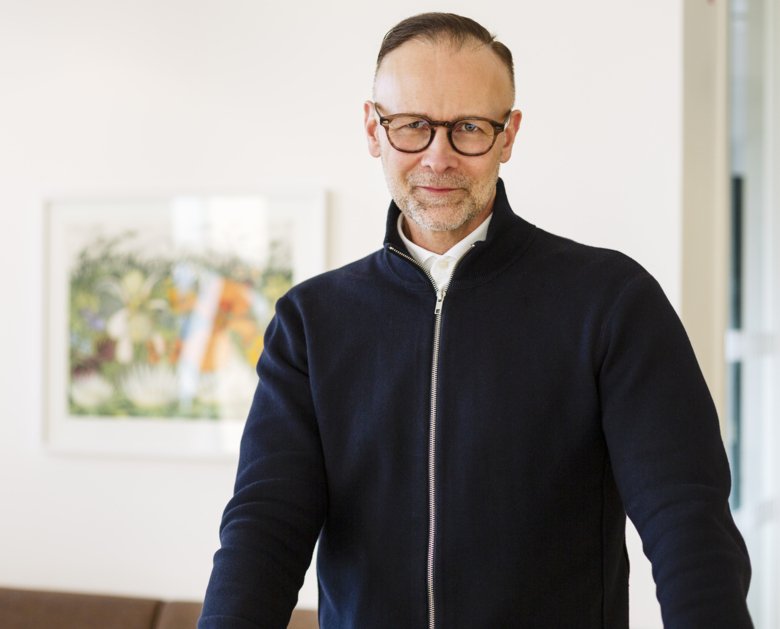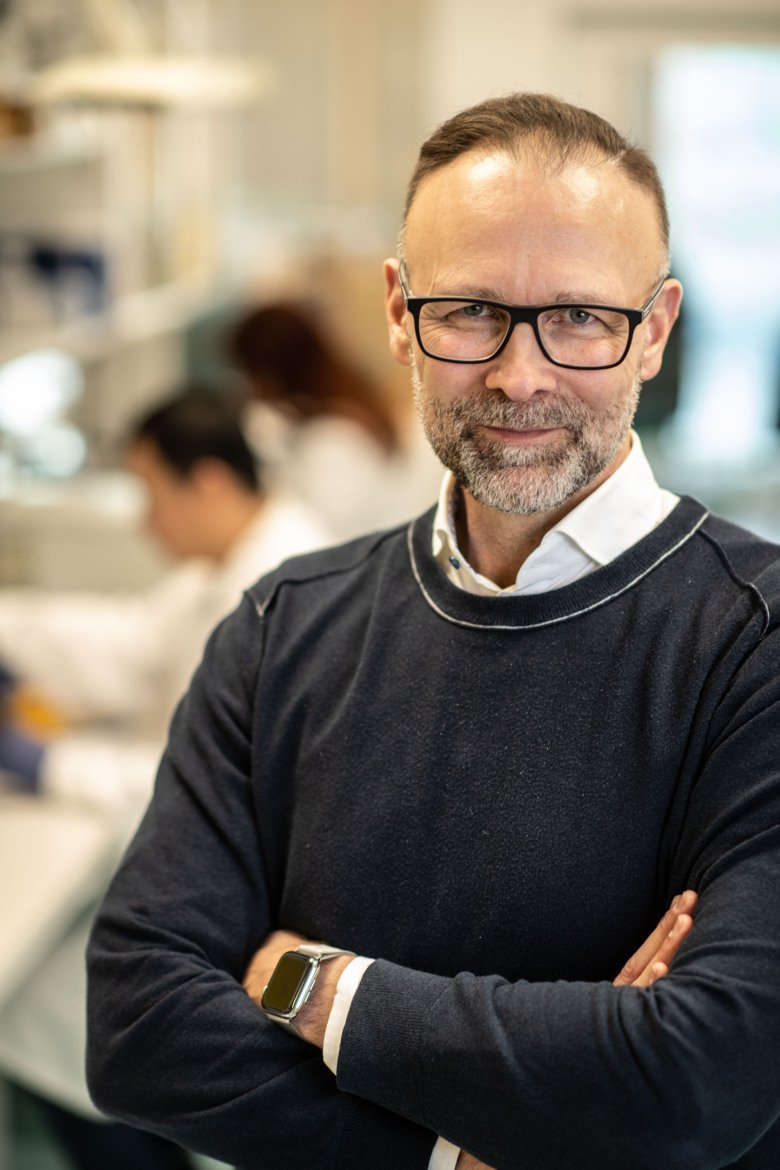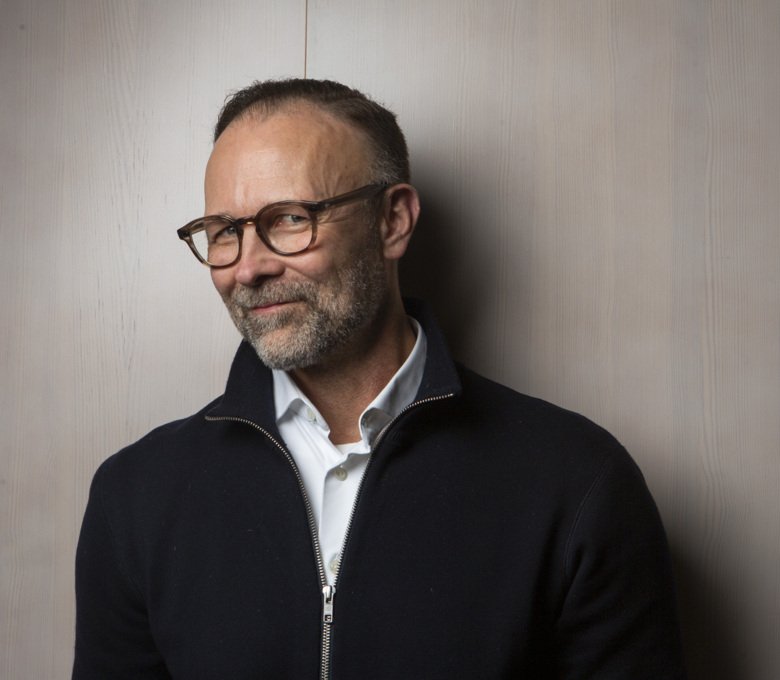KI’s new vice-president Martin Bergö: ”A good management team lets everyone’s voice be heard”

Martin Bergö does not want to make drastic changes. As KI’s new vice-president, he plans to first tidy his desk, then team up with the new president, Annika Östman Wernerson, and listen to what the organisation has to say. “We’ll be tackling the most important issues together, such as establishing a good internal dialogue.” [The interview was published in spring 2023 when the university management took office.]
As of March 1, Karolinska Institutet will have a new management. On the same day as Annika Östman Wernerson becomes the new president, Martin Bergö will assume the vice-presidency. The pair have worked together before as the academic vice-presidents for research and higher education.
“This will be exciting,” says Martin Bergö about his new appointment, “especially given that Annika and I complement each other so well, in terms of both subject matter and personality. We share a view of what needs to be done, which has been clear ever since we started to interact as academic vice-presidents a few years ago.”
Name: Martin Bergö
Title: Professor at the Department of Biosciences and Nutrition and former academic vice-president for research at Karolinska Institutet. Member of the Nobel Assembly at Karolinska Institutet. KI’s vice-president as of March 1, 2023.
Age: 52
How would you describe this shared view?
“I think we both feel that KI is a little disjointed. It’s not enough to have a strategy and an ambitious vision, you need to feel it too. So we plan to work hard on what Annika calls ‘KI is us’, the ‘we-spirit’ in other words. We are both aware of the importance for the top management to be receptive to what people in the organisation are saying. A good management team lets everyone’s voice be heard. We have recruited truly engaged and skilled people throughout our organization, and I believe that if we listen to them properly, we will be able to channel KI's collective will to make us even better.”
Will there be any tangible changes?
“New managers often want to make their mark, for example by launching a substantial structural change. It’s visible and easy to point to, but it can also be counter-productive. We’re going to start by observing and listening in various ways, including in regular meetings with various university representatives such as the heads of department. We’ll then see if improving the dialogue will be sufficient or if we’ll need to make organisational adjustments. And if that’s the case, we must do it out together – it’s not enough to just talk about what doesn’t work and then expect the management to fix everything.”
What issues will be key in your new role, and how will you work together with the KI president?
“We’ll be tackling the most important issues together, such as establishing a good internal dialogue. We’ll also have to review what councils and boards we’ll be involved in. My predecessor, Anders Gustafsson, had two to three dozen different involvements, and we may scale down that number a bit to focus more intently on a fewer number of issues. The needs of the university will decide.
“Another important issue is our dialogue with the outside world. I’m seeing a worrying degree of alternative knowledge being spread, and a need in society to adopt quick fixes to complex problems. We don’t need quick fixes, we need effective ones. Universities must set the tone of the debate on what knowledge acquisition and fact-checking entails.
“But arguably my most important job will be to protect and promote academic freedom and the curiosity-driven basic research which is our most valuable investment in knowledge and health for coming generations.”
You have a research-heavy background. How do you feel about representing the entire university?

“The job of universities involves both research and education, and Annika and I both believe that the best education is connected with and inspired by research, and vice versa. It’s imperative that our students obtain an education rooted in research and to meet the best researchers and teachers, and we need to involve students in research early on in their studies.”
What qualities as a researcher will you be bringing to your new role?
“The empirical mindset. The importance of understanding how something works, to identify weaknesses and then develop principles to rectify them. I aim for a research-inspired kind of leadership. I also realise that I can’t go in and just start changing things. KI is like a large ship, and turning a ship takes time. We must take the long view and think beyond our own tenure to create lasting improvements.”
What’s the best thing about KI?
“That we have such vast specialist knowledge and breadth for being a medical university. It’s unique. We’re world-leading in several traditional medical fields, and we’re expanding our research in others, such as medical management, pedagogy and patient-centred care. Our ability to unite and muster our resources when called upon to do so, such as our response to the COVID pandemic and our precision medicine initiative, is also impressive.”
What would you like to change?
“One thing that could be better is the ‘we-spirit’. I want everyone to feel proud about working at KI. Of course, many of us do, but we could be even more. Some research fields need to be strengthened, such as primary care research, which has been somewhat side-lined for example by molecular research. We also need to deepen our collaboration with the healthcare sector so that we can more easily store, access and handle patient data and conduct more clinical studies. Many doctors and other healthcare professionals choose not to research because it’s complicated and too time-consuming. I want research to be a more self-evident part of being at a university hospital. Research should be fun and important!”
Tell us something that few people know about you.
“My wife searches for diagnoses for me, but concludes that I probably don’t have any. But I’m extremely pedantic and my desk is always clear at the end of the working day. And if I work from home, the entire house must first be clean. The dishes must be done, the laundry folded, the chairs straightened and the pillows fluffed. Only then can I settle down to work.
Martin Bergö on his research
 Photo: Martin Stenmark
Photo: Martin StenmarkMartin Bergö addresses the debate about vitamin pills
Even as a child, Martin Bergö wanted to be a scientist. And he did. His biggest discovery so far is that vitamins and antioxidants can drive tumour growth and worsen the prognosis for cancer patients. "Our research and that of others has found that people with cancer, or with an increased risk of cancer, should not take vitamin supplements."
